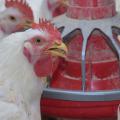Mistakes When Grilling Broilers
Here are some common mistakes and an explanation of how to correct each of them.
Fire too hot -- Broilers must be cooked on a low to medium heat to prevent burning. Normally, when cooking fewer than six halves, allow one pound of charcoal to cook each chicken half. Use only one layer of coals. The coals should touch each other and should cover an area a little larger than the area covered by the broilers being grilled. Occasionally, in covered grills, a few coals need to be added as a partial second layer. The heat is controlled in a covered grill by adjusting the air vents in the bottom and top of the grill. Keep these vents about three-fourths to fully open during the latter part of the grilling. Gas grills usually have to be set on low to grill broilers, and electric grills should be set on about 300o to 350o Fahrenheit.
Trying to cook too quickly -- Unlike steak and pork chops that can be grilled in 10 to 20 minutes, broilers require a grilling time of at least 1 and one-half hours under near ideal conditions. If you have trouble keeping a good fire, the cooking time can require 2 hours.
Using a tomato basting sauce -- Nearly all commercially prepared barbecue sauces have a tomato or ketchup-like base. Using such products while grilling broilers almost always results in burning and a poorly finished product. If you insist on using the tomato-based barbecue sauce, baste the broilers with only cooking oil during the first three-fourths of the cooking period, while the coals are hottest. Then mix a little oil with the barbecue sauce for the last 30 minutes of cooking, after the heat has subsided. This helps prevent burning.
Having the grill rack too near the fire -- With open top grills, the greater the distance the chicken is from the fire, up to 18-inches, the better. A distance of only 6 to 10-inches may be possible with small grills. Unless the fire decreases considerably, keep the grill rack at the highest setting throughout the cooking period. With closed top grills, 5 to 10-inches between the fire and grill rack is adequate, because the heat is easier to control.
Not using enough salt -- Broilers readily take up seasoning, and salt is one of the main seasonings. Salt the broiler halves thoroughly before cooking by opening the spout on the salt box and sprinkling salt over the moist broiler half. Use approximately one tablespoon of salt per half. Salt the broiler halves until you are sure you have used too much, and you may have enough. Most of the salt washes off during cooking. If you elect not to salt the broilers before grilling, add 2 to 4 tablespoons of salt, depending on the salt content of the ingredients, to the recipes shown later. Heat and stir the mixture until the salt is dissolved.
Refer to the publication Grilling Mississippi Broilers for additional information on the cooking of broilers on an outdoor grill.
Publications
News
STARKVILLE, Miss. -- Until an avian flu vaccine for chickens or other alternative is federally approved, commercial poultry operations in the U.S.
STARKVILLE, Miss. -- If egg prices have seemed higher than ever lately, it’s because they are, and consumers can place much of the blame squarely at the feet of the ongoing bird flu outbreak.
With highly pathogenic avian influenza, or HPAI, in the environment in Mississippi, owners of backyard flocks have to take extra steps to keep their chickens healthy.
Avian influenza poses an extremely low risk to human health and none to food safety in Mississippi, but its presence poses a risk to backyard flocks and the state’s $3 billion commercial poultry industry.







